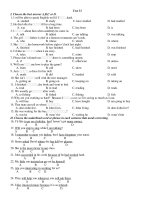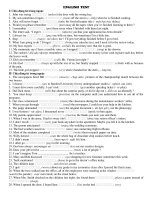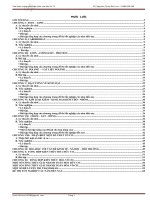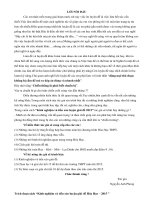Giới thiệu sách Củng cố và ôn luyện tiếng Anh 8 tập 2
Bạn đang xem bản rút gọn của tài liệu. Xem và tải ngay bản đầy đủ của tài liệu tại đây (705.07 KB, 16 trang )
BÙI THỊ KIỀU ANH (Chủ biên) - NGUYỄN HỒNG QUÂN
VŨ HỒNG LOAN - LÊ THỊ HỒNG THÚY - NGUYỄN THỊ HUYỀN TRANG
NGUYỄN ĐÀ GIANG - QUÁCH THỊ LAN HƯƠNG - LÊ VŨ KIỀU LINH - TRỊNH ĐAN LY
CỦNG CỐ VÀ ÔN LUYỆN
TIẾNG ANH 8
TẬP 2
THEO CHƯƠNG TRÌNH 10 NĂM CỦA BỘ GIÁO DỤC VÀ ĐÀO TẠO
NHÀ XUẤT BẢN ĐẠI HỌC QUỐC GIA HÀ NỘI
1
Các tác giả
TT
2
Họ tên
Cơ quan công tác
1
Bùi Thị Kiều Anh
Sở Giáo dục và Đào tạo Hà Nội
2
Nguyễn Hồng Quân
Công ty Cổ phần Giáo dục Fermat
3
Vũ Hồng Loan
Phòng Giáo dục và Đào tạo Nam Từ Liêm
4
Lê Thị Hồng Thúy
Trường THPT Trần Phú, Vĩnh Yên, Vĩnh Phúc
5
Nguyễn Thị Huyền Trang
Trường THPT Đại Từ, Đại Từ, Thái Nguyên
6
Nguyễn Đà Giang
Phòng Giáo dục và Đào tạo Long Biên
7
Quách Thị Lan Hương
Phòng Giáo dục và Đào tạo Hà Đông
8
Lê Vũ Kiều Linh
Phòng Giáo dục và Đào tạo Hai Bà Trưng
9
Trịnh Đan Ly
Phòng Giáo dục và Đào tạo Đống Đa
CỦNG CỐ VÀ ÔN LUYỆN TIẾNG ANH 8 (TẬP 2)
MỤC LỤC
LỜI NÓI ĐẦU................................................................................... 5
Unit 7. POLLUTION......................................................................... 7
Unit 8. ENGLISH SPEAKING COUNTRIES...............................27
Unit 9. NATURAL DISASTERS.....................................................45
REVIEW 3..........................................................................................61
Unit 10. COMMUNICATION........................................................77
Unit 11. SCIENCE AND TECHNOLOGY....................................96
Unit 12. LIFE ON OTHER PLANETS......................................... 116
REVIEW 4........................................................................................ 134
3
4
CỦNG CỐ VÀ ÔN LUYỆN TIẾNG ANH 8 (TẬP 2)
LỜI NÓI ĐẦU
Củng cố và Ôn luyện Tiếng Anh 8 (tập 2) là cuốn sách nằm trong bộ 08 cuốn
cùng tên cấp THCS gồm các môn Toán, Ngữ văn và Tiếng Anh, dành cho giáo
viên và học sinh trong quá trình dạy học bổ trợ và nâng cao. Đây là bộ sách được
tổ chức biên soạn công phu, có sự tham gia của các giảng viên, giáo viên giỏi ở
nhiều tỉnh, thành và các cán bộ chỉ đạo môn học của các cơ sở giáo dục và đào tạo
với trình độ chuyên môn cao, đầy tâm huyết và kinh nghiệm.
Củng cố và Ôn luyện Tiếng Anh 8 (tập 2) được biên soạn theo các chủ đề
bám sát nội dung của 6 đơn vị bài học và 2 bài ôn tập trong Sách giáo khoa Tiếng
Anh 8 (Tập 2) hệ 10 năm nhằm giúp giáo viên và học sinh lớp 8 có một tài liệu
luyện tập các bài học trên lớp. Các dạng bài tập được trình bày phong phú về mặt
nội dung và đa dạng về mặt hình thức, trong đó tập trung vào luyện ngữ âm,
trọng âm, từ vựng (tổng hợp từ vựng của từng bài, có giải thích từ loại, nghĩa,
phiên âm quốc tế và ví dụ), cách cấu tạo từ, tóm tắt ngữ pháp và hệ thống bài tập
thực hành thông qua kỹ năng đọc hiểu, kỹ năng viết và sử dụng ngôn ngữ tổng
hợp trong các bài kiểm tra (Tests).
Mỗi một bài học (từ Unit 7 đến Unit 12) được chia thành 2 mục lớn như sau:
A. Tóm tắt lý thuyết (Vocabulary, Word Formation and Grammar): Mục
này được tóm tắt và hệ thống các từ vựng, cấu tạo từ và ngữ pháp.
B. Luyện tập (Test 1 và Test 2): Bao gồm 2 bài kiểm tra (bài tập tổng hợp về
ngữ âm, từ vựng, ngữ pháp và các kỹ năng sử dụng ngôn ngữ như đọc và viết).
Bài ôn tập (Review 3 và Review 4): Được trình bày sau mỗi 03 bài học, thiết
kế dưới hình thức các dạng bài tập phong phú nhằm giúp học sinh lớp 8 củng cố
kiến thức và đánh giá xếp loại học sinh theo quy chế của Bộ Giáo dục và Đào tạo.
Củng cố và Ôn luyện Tiếng Anh 8 (tập 2) được biên soạn dựa trên thực tiễn
của việc dạy và học Tiếng Anh hiện nay trong các trường phổ thông. Đây sẽ là
tài liệu tham khảo bổ ích cho giáo viên và học sinh, góp phần thiết thực nâng cao
khả năng sử dụng ngôn ngữ tiếng Anh của học sinh phổ thông trong thời kỳ đổi
mới và hội nhập quốc tế. Trong quá trình biên soạn bộ sách này, chúng tôi đã
5
nhận được sự động viên, khích lệ và giúp đỡ rất nhiều của các cá nhân, tổ chức,
các bạn đồng nghiệp. Cho phép chúng tôi được nói lời cảm ơn đối với các tập thể
và cá nhân nói trên.
Mặc dù các tác giả đã rất cố gắng, song cuốn sách khó tránh sai sót. Rất mong
nhận được sự góp ý của bạn đọc. Ý kiến góp ý xin gửi về:
Công ty Cổ phần Giáo dục Fermat
Địa chỉ: Số 6A1, Tiểu khu Ngọc Khánh, Ba Đình, Hà Nội
Điện thoại: 02462734948. Hotline: 0977333961
Email:
Website: www.fermat.edu.vn
Xin trân trọng cảm ơn!
Các tác giả
6
CỦNG CỐ VÀ ÔN LUYỆN TIẾNG ANH 8 (TẬP 2)
Unit
7
POLLUTION
A. REVIEW
I. Vocabulary
Words
affect (v)
Transcription
/əˈfekt/
Meaning
làm ảnh
hưởng
tảo
Examples
How will those changes affect us?
Algae are a diverse group of aquatic
organisms
aquatic (a)
/əˈkwætɪk/
dưới nước Aquatic animal lives in water for
most or all of its life
billboard (n) /ˈbɪlbɔːd/
biển
There is no question that public
quảng cáo sentiment is against the billboard.
ngoài trời
blood
/ˈblʌd preʃə(r)/ huyết áp
The doctor will take your blood
pressure (n)
pressure in a moment.
cause (n.v)
/kɔːz/
nguyên
Unemployment is a major cause of
nhân, gây poverty.
ra
Will it cause any difficulties if I
don’t come early?
cholera (n)
/ˈkɒlərə/
bệnh tả
A cholera epidemic swept the whole
country.
come up with /kʌm ʌp wɪð/
nghĩ ra
He came up with a new idea for
(v)
increasing sales.
contaminate /kənˈtæmɪneɪt/ làm bẩn
The drinking water has become
(v)
contaminated with arsenic.
contaminant /kənˈtæmɪnənt/ chất gây
Filters cannot remove all
(n)
bẩn
contaminants from water.
dump (v)
/dʌmp/
vứt, bỏ
Too much toxic waste is being
dumped at rivers.
earplug (n)
/ˈɪəplʌɡ/
cái nút tai Please put earplugs in your ears,
and look.
effect (n)
/ɪˈfekt/
kết quả
I tried to persuade her, but with
little or no effect.
fine (v)
/faɪn/
phạt tiền
She got fined £200 for parking
illegally.
algae (n)
/ˈældʒiː/
7
Words
Transcription
litter (n.v)
measure (v)
non-point
source
pollution (n)
permanent
(a)
point source
pollution (n)
poison (n.v)
pollutant (n)
radioactive
(a)
radiation (n)
thermal (a)
untreated (a)
visual (a)
8
Examples
A group of ducks floated by.
Groundwater is the water found
underground in the cracks and
spaces in soil, sand and rock.
/ˈhɪərɪŋ lɒs/
mất thính Hearing loss is a partial or total
lực
inability to hear.
/ˈɪləstreɪt/
minh họa He told me a little story to
illustrate his points.
/ˈlɪtə(r)/
rác vụn,
Please do not leave litter after your
vứt rác
party.
/ˈmeʒə(r)/
đo
Cloth is measured in metres.
/nɒn pɔɪnt sɔːs ô nhiễm
Non-point source pollution is
pəˈluːʃn/
không
caused by rainfall or snowmelt
nguồn
moving over and through the
ground.
/ˈpɜːmənənt/
vĩnh viễn We decided to make the contract
permanent.
/pɔɪnt sɔːs
ô nhiễm có Point source pollution results
pəˈluːʃn/
nguồn
when the contaminants come from a
single location.
/ˈpɔɪzn/
chất độc,
These words are pure poison to me.
làm nhiễm
độc
/pəˈluːtənt/
chất gaay Pollutants can be artificial
ô nhiễm
substances or naturally occurring
substances.
/ˌreɪdiəʊˈæktɪv/ thuộc
Uranium is a radioactive material.
phóng xạ
/ˌreɪdiˈeɪʃn/
phóng xạ Nuclear testing exposed millions of
people to radiation.
/ˈθɜːml/
thuộc về
Thermal power generation plant
nhiệt
is the most conventional source of
electric power.
/ˌʌnˈtriːtɪd/
không
This wood is vulnerable to water
được xử lý damage because it’s untreated.
/ˈvɪʒuəl/
thuộc thị
He has a very good visual memory.
giác
float (v)
/fləʊt/
groundwater /ˈɡraʊndwɔːtə/
(n)
hearing loss
(n)
illustrate (v)
Meaning
nổi
nước
ngầm
CỦNG CỐ VÀ ÔN LUYỆN TIẾNG ANH 8 (TẬP 2)
II. Word formation
Words
affect (v)
Related words
effect (n)
effective (a)
effectively (adv)
ineffective (a)
blood (n)
bloody (a)
bloodily (adv)
bloodless (a)
bleed (v)
press (v)
pressure (n)
pressurise (v)
pressurisation (n)
contaminate (v) contamination (n)
contaminated (a)
contaminant (n)
illustrate (v)
illustration (n)
illustrator (n)
illustrative (a)
measure (v)
measurement (n)
measureless (a)
measuring tape
(n)
permanent (a)
permanently
(adv)
permanence (n)
impermanent (a)
poison (n.v)
poisoner (n)
poisoning (n)
poisonous (a)
pollute (v)
pollution (n)
polluted (a)
pollutant (n)
radioactive (a)
radioactivity (n)
radiate (v)
radiation (n)
radiator (n)
Transcription
/ɪˈfekt/
/ɪˈfektɪv/
/ɪˈfektɪvli/
/ˌɪnɪˈfektɪv/
/ˈblʌdi/
/ˈblʌdɪli/
/ˈblʌdləs/
/bliːd/
/ˈpreʃə(r)/
/ˈpreʃəraɪz/
/ˌpreʃəraɪˈzeɪʃn/
/kənˌtæmɪˈneɪʃn/
/kənˈtæmɪneɪtɪd/
/kənˈtæmɪnənt/
/ˌɪləˈstreɪʃn/
/ˈɪləstreɪtə(r)/
/ˈɪləstrətɪv/
/ˈmeʒəmənt/
/ˈmeʒələs/
/ˈmeʒərɪŋ teɪp/
Meaning
kết quả, sự ảnh hưởng
hiệu quả
một cách hiệu quả
không hiệu quả
đẫm máu, tàn bạo
một cách đẫm máu
không đổ máu
chảy máu
áp suất
gây áp lực
sự gây áp lực
sự làm bẩn
bị ô nhiễm
chất gây bẩn
sự minh họa
người, vật minh họa
có tính minh họa
sự đo, phép đo
vô tận
thước cuộn
/ˈpɜːmənəntli/
một cách lâu dài
/ˈpɜːmənəns/
/ɪmˈpɜːmənənt/
/ˈpɔɪzənə(r)/
/ˈpɔɪzənɪŋ/
/ˈpɔɪzənəs/
/pəˈluːʃn/
/pəˈluːtɪd/
/pəˈluːtənt/
/ˌreɪdiəʊækˈtɪvəti/
/ˌreɪdiˈeɪʃn/
/ˈreɪdieɪtə(r)/
sự lâu dài
tạm thời
người đầu độc
sự nhiễm độc
có độc
sự ô nhiễm
bị ô nhiễm
chất gây ô nhiễm
tính phóng xạ
sự phát xạ
vật phát xạ
UNIT 7. POLLUTION
9
Words
treat (v)
Related words
treatment (n)
treated (a)
untreated (a)
visual (a)
visually (adv)
visible (a)
visibility (n)
vision (n)
Transcription
/ˈtriːtmənt/
/triːtɪd/
/ˌʌnˈtriːtɪd/
/ˈvɪʒuəl/
/ˈvɪʒuəli/
/ˈvɪzəbl/
/ˌvɪzəˈbɪləti/
Meaning
sự xử lý
được xử lý
không được xử lý
thuộc thị giác
về mặt thị giác
có thể nhìn thấy
tầm nhìn
III. Grammar
1. Câu điều kiện loại 1 (Conditional sentences type 1 – Review)
1.1. Cấu trúc (Structure)
If clause
Main clause
If + Subject + V (present simple) Subject + will/may/might/could + V (bare inf.)
1.2. Cách dùng (Uses)
- Câu điều kiện loại 1 mô tả hành động, tình huống có thật hoặc có khả năng
cao sẽ xảy ra ở hiện tại hoặc tương lai.
Ví dụ:
If I see him tomorrow, I will speak to him.
I will not let her in if she is late again.
If anything changes, I will let you know.
1.3. Lưu ý (Notice)
- Khả năng xảy ra trong câu điều kiện là khả năng của hành động trong mệnh
đề if chứ không phải hành động trong mệnh đề chính.
- Có thể thêm would vào trước động từ trong mệnh đề if trong câu nói lịch sự.
Ví dụ: If you would see me tomorrow, I will show you my new car.
- Có thể dùng câu mệnh lệnh hoặc câu đề nghị trong mệnh đề chính.
Ví dụ:
10
If you see David, please give him this pen.
Could you give David this pen if you see him?
May I see you for a while if you don’t mind?
CỦNG CỐ VÀ ÔN LUYỆN TIẾNG ANH 8 (TẬP 2)
- May, might và could có thể được sử dụng thay cho will trong mệnh đề chính
nhưng khi đó sự chắc chắn xảy ra của hành động trong mệnh đề đó sẽ giảm đi.
Ví dụ:
If I see him tomorrow, I will speak to him. (Việc tôi sẽ nói chuyện với anh ấy
là chắc chắn sẽ xảy ra nếu tôi gặp anh ấy)
If I see him tomorrow, I may/might/could speak to him. (Việc tôi sẽ nói
chuyện với anh ấy chưa chắc sẽ xảy ra cho dù tôi gặp anh ấy)
2. Câu điều kiện loại 2 (Conditional sentences type 2)
2.1. Cấu trúc (Structure)
If clause
Main clause
If + Subject + V (past simple)
Subject + would/could/might + V (bare inf.)
2.2. Cách dùng (Uses)
- Câu điều kiện loại 2 mô tả sự việc ít có khả năng xảy ở hiện tại hoặc tương lai.
Ví dụ:
I don’t often see him If I saw him tomorrow, I would speak to him.
I don’t think anything will change. If anything changed, I would let
you know.
- Câu điều kiện loại 2 mô tả sự việc không có thật ở hiện tại hoặc tương lai,
một giả thuyết.
Ví dụ:
I don’t have any time this week. If I had some time, I would go out for dinner.
I am not a teacher. If I were a teacher, I would apply for that job.
- Câu điều kiện loại 2 còn được dùng để đưa ra lời khuyên.
Ví dụ:
If I were you, I wouldn’t do so.
If I were you, I would buy a new car.
2.3. Lưu ý (Notice)
- Khả năng xảy ra trong câu điều kiện là khả năng của hành động trong mệnh
đề if chứ không phải hành động trong mệnh đề chính.
- Động từ to be trong câu điều kiện loại 2 là were cho tất cả các đại từ. Trong
UNIT 7. POLLUTION
11
một vài trường hợp was được chấp nhận nhưng để chắc chắn đúng trong mọi
trường hợp, ta nên dùng were cho tất cả các đại từ làm chủ ngữ.
- Might có thể được sử dụng thay cho would trong mệnh đề chính nhưng khi
đó sự chắc chắn xảy ra của hành động trong mệnh đề đó sẽ giảm đi.
Ví dụ:
If she were late again, I would not let her in. (Việc tôi sẽ không cho cô ấy vào
là chắc chắn)
If she were late again, I might not let her in. (Tính chắc chắn của việc tôi sẽ
không cho cô ấy vào đã giảm đi)
- Không dùng should để thay thế cho would trong câu điều kiện loại 2.
B. PRACTICE TEST
TEST 1
PHONETICS
I. Write the given words in the box to the correct part of the table according to
the tress pattern.
logical; medical; tragic; chemical; academic; energetic; systematic; critical;
athletic; domestic; dramatic; emphatic; artistic; mechanical; catholic; public
Oo
Ooo
oOo
oOoo
ooOo
II. Use the words given in the box to complete the following sentences. Then
practice saying them aloud. There are two extra words you don’t need to use.
tragic
chemical
systematic
critical
athletic
domestic
artistic
mechanical
1. __________ treatment with chlorine provides some protection against contamination.
2. She comes from a very __________ family.
12
CỦNG CỐ VÀ ÔN LUYỆN TIẾNG ANH 8 (TẬP 2)
3. The university is very proud of its __________ facilities.
4. It would be __________ if her talent remained unrecognized.
5. The breakdown was due to a __________ failure.
6. The prisoner was subjected to __________ torture.
VOCABULARY AND GRAMMAR
I. Complete the table with appropriate verbs, nouns and adjectives.
Verb
Noun
Adjective
affect
effect
(1) ____________
(2) ____________
blood
bloody
contaminate
(3) ____________
contaminated
illustrate
illustration
(4) ____________
poison
poison
(5) ____________
(6) ___________
pollution
polluted
II. Give the correct form of the word in brackets to complete the following
sentences.
1. The company must reduce costs to compete __________. (EFFECT)
2. The small blood vessels in the nose __________ easily. (BLOOD)
3. The barriers gave way under the __________ of the crowd. (PRESS)
4. Filters do not remove all __________ from water. (CONTAMINATE)
5. I will use one recent example as an __________. (ILLUSTRATE)
6. I’ll need to take your waist __________. (MEASURE)
7. We no longer talk of the __________ of marriage. (PERMANENT)
8. There are various __________ available for this condition. (TREAT)
9. They emit 90% less __________ than standard models. (POLLUTE)
10. It is important to take precise __________ of the structure. (MEASURE)
UNIT 7. POLLUTION
13
III. Put the verbs in brackets into the correct form of conditional sentences type 1.
1. If I (have) __________ time, I (finish) __________ that letter.
2. What you (do) __________ if you (miss) __________ the plane?
3. Nobody (notice) __________ if you (make) __________ a mistake.
4. If you (drop) __________ that glass, it (break) __________.
5. If you (not leave) __________, I (call) __________ the police.
6. I (finish) __________ that letter if I (have) __________ time.
IV. Choose the best answer to complete each of the following sentences.
1. If I were you, I __________ for a new car to buy.
A. would look
B. will look
C. look
D. looking
2. If Trang __________ ill, she would go out with us.
A. isn’t
B. aren’t
C. wasn’t
D. not been
3. If there __________ fewer cars on the road, there would be less accident.
A. is
B. were
C. are
D. be
4. If people really cared about environment, they __________ waste into rivers.
A. didn’t dump
B. don’t dump
C. shan’t dump
D. wouldn’t dump
5. You __________ so tired if you went to bed earlier.
A. won’t be
B. shan’t be
C. couldn’t be
D. wouldn’t be
6. If you really __________ me, you would buy me a diamond ring.
A. loved
B. love
C. loves
D. loving
7. If I knew where she lived, I __________ and see her.
A. will go
B. would go
C. should go
D. went
8. If I __________ taller, I would buy this dress.
A. am
B. are
C. were
D. being
9. Filters do not remove all __________ from water.
A. contaminate B. contaminants
C. contaminating
D. contamination
10. __________ is found under the ground in soil, rocks, etc.
14
A. sea water
B. salt water
CỦNG CỐ VÀ ÔN LUYỆN TIẾNG ANH 8 (TẬP 2)
C. groundwater
D. hot water
11. If I won a lottery, I __________ a lot on charity.
A. spend
B. spent
C. will spend
D. would spend
12. If the supermarket is open, I __________ some food there.
A. will buy
B. would bue
C. bought
D. has bought
13. I will talk to her if you __________ to do it.
A. won’t want
B. didn’t want
C. don’t want
D. doesn’t want
14. If I __________ more money, I would buy a better car.
A. have
B. had
C. will have
D. would have
15. The farmer had put down some rat __________.
A. poisoning
B. poisoner
C. poisoned
D. poison
READING
I. Read the following text and decide which answer best fits each numbered
blank.
Industrialized countries (1) __________ worked to reduce levels of sulphur
dioxide, smog, and smoke in (2) __________ to improve people’s health. But a
result, not predicted until recently, is that (3) __________ lower sulphur dioxide
levels may actually (4) __________ global warming worse. Just as sulphur dioxide (5) __________ volcanoes can cool the planet by blocking sunlight, cutting
the amount (6) __________ the compound in the atmosphere lets more sunlight
through, warming the Earth. This effect is exaggerated (7) __________ elevated
levels of other greenhouse gases in the atmosphere trap the additional heat.
Most people agree that to curb global warming, (8) __________ variety of measures need to be taken. On a (9) __________ level, driving and flying less, recycling, and conservation reduces a person’s “carbon footprint”—the amount of
carbon dioxide a person is responsible for (10) __________ into the atmosphere.
1. A. has
2. A. direction
1. A. a
2. A. make
3. A. in
4. A. on
5. A. what
B. have
B. demand
B. an
B. do
B. within
B. of
B. when
C. had
C. instruction
C. the
C. go
C. to
C. with
C. which
D. having
D. order
D. one
D. move
D. from
D. under
D. where
UNIT 7. POLLUTION
15
UNIT 7. POLLUTION
TEST 1
PHONETICS
I. Write the given words in the box to the correct part of the table according to the tress patern.
Oo
Ooo
oOo
oOoo
ooOo
public, tragic
catholic, chemical, critical, logical, medical
athletic, domestic, dramatic, emphatic, artistic
mechanical
academic, energetic, systematic
II. Use the words given in the box to complete the following sentences. Then pracise saying
them aloud. There are two extra words you don’t need to use.
1. Chemical
4. tragic
2. artistic
5. mechanical
3. athletic
6. systematic
VOCABULARY AND GRAMMAR
I. Complete the table with appropriate verbs, nouns and adjectives.
1. effective
4. illustrative
2. bleed
5. poisonous
3. contmination
6. pollute
II. Give the correct form of the word in brackets to complete the following sentences.
1. effectively
5. illustration
9. pollution
2. bleed
6. measurement
10. measurements
3. pressure
7. permanence
4. contaminats
8. treatments
III. Put the verbs in brackets into the correct form of conditional sentences type 1.
1. have – will finish
4. drop – will break
2. will you do – miss
5. don’t leave – will call
3. will notice - make
6. may finish – have
IV. Choose the best answer to complete each of the following sentences.
1. A
2. C
3. B
4. D
5. D
6. A
7. B
8. C
9. B
10. C
11. D12. A13. C14.B15. D
READING
I. Read the following text and decide which answer best fits each numbered blank.
1. B
6. B
2. D
7. B
3. C
8. A
4. A
9. C
5. D
10. D
II. Read the following text and use the words given in the box to fill in the blanks.
1. different 2. us
6. why
7. nature
3. and
8. dead
4. However 5. due to
9. waste
10. chemicals
III. Read the following text and answer the questions below.
1. They are known to create several respiratory and heart conditions along with Cancer
ĐÁP ÁN
7









